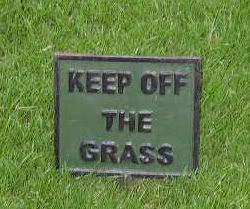10 years is a long time
As my earlier post may have indicated, this week I've had thoughts of high school running through my brain. Usually, I'm not one to get very sentimental about high school. I didn't love it and I didn't hate it. And towards the end, I just wanted to leave it. All in all, fairly standard emotional fare for the teenage human subset. However, it has come to my attention that 2006 is the year of my 10-year HS reunion. I'm almost 100% sure that I can't attend (living in the UK and all), just like I couldn't attend my 5-year reunion (Portland is like 3000 miles from where I grew up). I'm not really bummed about that, since there are only a handfull of people I would care to see. What I am bummed about is how this is just one more indication that my "carefree" cough 20s are quickly coming to a close. I don't remember signing up for the "lightspeed" lifetime. What the hell happened?
As for school, today I went to my first seminar for the term. It's a little later than the early modern period I study (1490-1680, give or take a decade); it focuses on what is called the "Long 18th century," which basically means 1680-1820, or so. Most historians still consider the "Long Eighteenth century" early modern because it predates the main thrust of the Industrial Revolution, which really got going around the middle of the 19th century. Anyway, I wanted to attend this seminar series so I could get a better understanding of how issues during my period may have continued or changed in the following centuries. The speaker at today's seminar gave an intriguing paper on Scots law concerning masters and servants. It was quite interesting and very germane to the topic I'm planning to research in Ipswich this term. I learned a great deal about the differences between Scots and English apprenticeship/labor law. Even though technically British law should have been united at the time, the Scots tended to do their own thing if the King's law contradicted the local legal custom. Like I said, very enlightening stuff! I'm glad I went.
Well, I think it's "winding down and getting ready to sleep" time...
Quote of the day:
"I like nonesense. It wakes up the brain cells." - Dr. Seuss


5 Comments:
pleasant dreams
It's a bit more than the Scots 'doing their own thing': there's (still) a quite separate Scottish legal system.
Have you read any of Douglas Hay's work on Master and Servant law? It's on my to read list, but I haven't got round to it (since it's mostly later than what I'm working on at the moment and there's a lot of stuff on my to read list...).
Sharon -
Amazingly enough, it was actually Doug Hay who was speaking! He was visiting from Canada and Joanna Innes invited him to speak at the seminar.
I'm terribly sorry about boiling down his argument into the "Scots doing their own thing." That was an incredibly oversimplified version of his talk. What he seemed to be saying was that Scots labor law differed greatly from English Parliamentary law at the time. That the statutes in Scotland would say they thought English statutes should be enforced, but only if they didn't contradict Scots law or go against local legal custom. Hay also said his research has shown a predisposition of Scots "Low Law" to leave the actual punishment up to the reasonable judgement of the JP or Bailiff (so it wouldn't actually state, "1-3 months in gaol", it would just say "punishment as ordered" or something to that effect.) I admit, I know very little when it comes to Scots law, especially Scots law in the 18th century. Most of my dabbling in legal history centers on the development legal regulation of the English poor in the 16th and early 17th century...so this is all a bit new to me...I welcome any thoughts you might have. :)
Also, I completely understand the situation of having a "to read" list that seems impossibly long....
Well, I hardly know anything about Scottish law either, but I have Scottish friends who are very protective about it... ;)
I've posted an online bibliography of secondary sources on early modern servants and apprentices - I don't know if it'd have anything useful you haven't already seen. (And if you have any references I haven't included, let me know. You can email me on sharon@earlymodernweb.org.uk) You've got me thinking that it'd be a good idea to put together another one on poor relief and the poor laws.
Sharon -
Thanks for the link to the online bib! I have a huge list of secondary sources for info on poor law and poor relief. We can chat more about it over email if you would like.
Post a Comment
<< Home